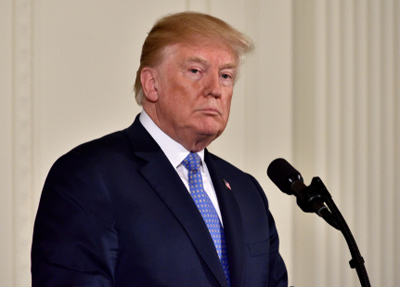Trump confirms he reimbursed Cohen for Stormy Daniels payment; was it a campaign finance violation?

President Donald Trump/Evan El-Amin (Shutterstock.com.)
President Donald Trump confirmed Thursday that he reimbursed his personal lawyer, Michael Cohen, for a $130,000 payment to porn star Stormy Daniels under a confidentiality agreement, while stressing that campaign money was not used.
Trump addressed the issue in a series of tweets, report the Washington Post and the New York Times. Trump said Cohen “received a monthly retainer, not from the campaign and having nothing to do with the campaign, from which he entered into, through reimbursement” the nondisclosure agreement.
Trump said the agreement “was used to stop the false and extortionist accusations” by Daniels about an affair.
Trump’s tweets followed an interview in which lawyer Rudy Giuliani—a recent addition to Trump’s legal team—told Fox News that Trump had reimbursed Cohen.
Giuliani said that, as far as he knew, Trump “didn’t know the specifics” but he did have a general arrangement that Cohen “would take care of things like this.” Giuliani said it was his understanding that Trump repaid Cohen through a monthly $35,000 retainer over a series of months “when he was doing no work for the president.”
Giuliani said the procedure removed the issue of whether the payment to Daniels was a campaign finance violation. The payment was made shortly before the election. Common Cause had filed a complaint alleging that the payment violated campaign reporting requirements because it amounted to an unreported in-kind contribution to Trump’s campaign and was designed to influence the election.
“It’s not campaign money,” Giuliani said. “No campaign finance violation.”
The Post spoke with a lawyer who disagreed with Giuliani’s assessment. Lawrence Noble, senior director and general counsel at the Campaign Legal Center, said the issue is the purpose of the payment.
“If the purpose of this was to stop [Daniels] from hurting the campaign,” Noble said, “then what you have is Cohen made a loan to the campaign.” Campaigns can’t avoid campaign reporting laws by taking loans and then paying them back, he said.
Noble also noted that Giuliani said the payment could have come from law firm funds. That poses another problem, he told the Post. That could be “evidence of an intent to hide the source, which could make it knowing and willful, which is criminal.”
University of California at Irvine law professor Richard Hasen makes similar points in an article for Slate.
“If what Giuliani says is true, and if the payments were made to help the campaign and not (just) to help Trump personally, the campaign may be implicated in illegal activity,” he wrote.
The FBI reportedly sought records of payments to Daniels and another woman when they raided of Cohen’s office, home and hotel room last month.
Daniels filed a lawsuit that claims she is not bound by the confidentiality agreement because Trump didn’t sign it. She also filed a lawsuit on Monday that contends Trump defamed her in a tweet belittling her sketch of a man who allegedly threatened her as a “total con job.”
Her lawyer, Michael Avenatti, told MSNBC that the latest “extortionist” tweet is also defamatory.
Mr. Cohen, an attorney, received a monthly retainer, not from the campaign and having nothing to do with the campaign, from which he entered into, through reimbursement, a private contract between two parties, known as a non-disclosure agreement, or NDA. These agreements are…..
— Donald J. Trump (@realDonaldTrump) May 3, 2018
…very common among celebrities and people of wealth. In this case it is in full force and effect and will be used in Arbitration for damages against Ms. Clifford (Daniels). The agreement was used to stop the false and extortionist accusations made by her about an affair,……
— Donald J. Trump (@realDonaldTrump) May 3, 2018
…despite already having signed a detailed letter admitting that there was no affair. Prior to its violation by Ms. Clifford and her attorney, this was a private agreement. Money from the campaign, or campaign contributions, played no roll in this transaction.
— Donald J. Trump (@realDonaldTrump) May 3, 2018



